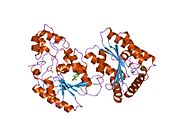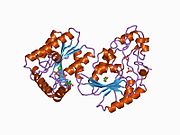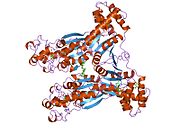PFKFB4: Difference between revisions
m Citations: [Pu178]Tweaked: doi. You can use this bot yourself! Report bugs here. |
|||
| Line 6: | Line 6: | ||
The bifunctional 6-phosphofructo-2-kinase ({{EC number|2.7.1.105}})/fructose-2,6-bisphosphatase ({{EC number|3.1.3.46}}) (PFKFB) regulates the steady-state concentration of [[fructose 2,6-bisphosphate]], an activator of a key regulatory enzyme of [[glycolysis]], [[phosphofructokinase]]. |
The bifunctional 6-phosphofructo-2-kinase ({{EC number|2.7.1.105}})/fructose-2,6-bisphosphatase ({{EC number|3.1.3.46}}) (PFKFB) regulates the steady-state concentration of [[fructose 2,6-bisphosphate]], an activator of a key regulatory enzyme of [[glycolysis]], [[phosphofructokinase]]. |
||
Latest research made by scientists at Cancer Research UK’s London Research Institute show that an enzyme called PFKFB4 is essential for balancing these two processes – making sure the cell’s energy needs are met without allowing free radicals to build up and trigger cell death. |
|||
Study leader Dr. Almut Schulze, said: “Our study suggests that PFKFB4 acts to fine tune the process by which cells convert glucose into energy. Blocking this enzyme in prostate cancer cells grown in the lab stalled growth and triggered a catastrophic build-up of free-radicals, suggesting that it could be a suitable drug target. Importantly, this route to energy production is common to many different types of cancer, suggesting that drugs to target it could potentially be used to treat a variety of cancers.” |
|||
== References == |
== References == |
||
Revision as of 09:10, 26 March 2012
6-phosphofructo-2-kinase/fructose-2,6-biphosphatase 4 also known as PFKFB4 is a enzyme which in humans is encoded by the PFKFB4 gene.[1][2]
Function
The bifunctional 6-phosphofructo-2-kinase (EC 2.7.1.105)/fructose-2,6-bisphosphatase (EC 3.1.3.46) (PFKFB) regulates the steady-state concentration of fructose 2,6-bisphosphate, an activator of a key regulatory enzyme of glycolysis, phosphofructokinase. Latest research made by scientists at Cancer Research UK’s London Research Institute show that an enzyme called PFKFB4 is essential for balancing these two processes – making sure the cell’s energy needs are met without allowing free radicals to build up and trigger cell death. Study leader Dr. Almut Schulze, said: “Our study suggests that PFKFB4 acts to fine tune the process by which cells convert glucose into energy. Blocking this enzyme in prostate cancer cells grown in the lab stalled growth and triggered a catastrophic build-up of free-radicals, suggesting that it could be a suitable drug target. Importantly, this route to energy production is common to many different types of cancer, suggesting that drugs to target it could potentially be used to treat a variety of cancers.”
References
- ^ Sakai A, Kato M, Fukasawa M, Ishiguro M, Furuya E, Sakakibara R (1996). "Cloning of cDNA encoding for a novel isozyme of fructose 6-phosphate, 2-kinase/fructose 2,6-bisphosphatase from human placenta". J. Biochem. 119 (3): 506–11. PMID 8830046.
{{cite journal}}: Unknown parameter|month=ignored (help)CS1 maint: multiple names: authors list (link) - ^ Manzano A, Pérez JX, Nadal M, Estivill X, Lange A, Bartrons R (1999). "Cloning, expression and chromosomal localization of a human testis 6-phosphofructo-2-kinase/fructose-2,6-bisphosphatase gene". Gene. 229 (1–2): 83–9. doi:10.1016/S0378-1119(99)00037-2. PMID 10095107.
{{cite journal}}: Unknown parameter|month=ignored (help)CS1 maint: multiple names: authors list (link)
Further reading
- Gerhard DS, Wagner L, Feingold EA; et al. (2004). "The status, quality, and expansion of the NIH full-length cDNA project: the Mammalian Gene Collection (MGC)". Genome Res. 14 (10B): 2121–7. doi:10.1101/gr.2596504. PMC 528928. PMID 15489334.
{{cite journal}}: Explicit use of et al. in:|author=(help)CS1 maint: multiple names: authors list (link) - Pilkis SJ, Claus TH, Kurland IJ, Lange AJ (1995). "6-Phosphofructo-2-kinase/fructose-2,6-bisphosphatase: a metabolic signaling enzyme". Annu. Rev. Biochem. 64: 799–835. doi:10.1146/annurev.bi.64.070195.004055. PMID 7574501.
{{cite journal}}: CS1 maint: multiple names: authors list (link) - Gómez M, Manzano A, Navarro-Sabaté A; et al. (2005). "Specific expression of pfkfb4 gene in spermatogonia germ cells and analysis of its 5'-flanking region". FEBS Lett. 579 (2): 357–62. doi:10.1016/j.febslet.2004.11.096. PMID 15642344.
{{cite journal}}: Explicit use of et al. in:|author=(help)CS1 maint: multiple names: authors list (link) - Minchenko OH, Ochiai A, Opentanova IL; et al. (2005). "Overexpression of 6-phosphofructo-2-kinase/fructose-2,6-bisphosphatase-4 in the human breast and colon malignant tumors". Biochimie. 87 (11): 1005–10. doi:10.1016/j.biochi.2005.04.007. PMID 15925437.
{{cite journal}}: Explicit use of et al. in:|author=(help)CS1 maint: multiple names: authors list (link) - Strausberg RL, Feingold EA, Grouse LH; et al. (2002). "Generation and initial analysis of more than 15,000 full-length human and mouse cDNA sequences". Proc. Natl. Acad. Sci. U.S.A. 99 (26): 16899–903. doi:10.1073/pnas.242603899. PMC 139241. PMID 12477932.
{{cite journal}}: Explicit use of et al. in:|author=(help)CS1 maint: multiple names: authors list (link) - Minchenko O, Opentanova I, Minchenko D; et al. (2004). "Hypoxia induces transcription of 6-phosphofructo-2-kinase/fructose-2,6-biphosphatase-4 gene via hypoxia-inducible factor-1alpha activation". FEBS Lett. 576 (1–2): 14–20. doi:10.1016/j.febslet.2004.08.053. PMID 15474002.
{{cite journal}}: Explicit use of et al. in:|author=(help)CS1 maint: multiple names: authors list (link) - Bobarykina AY, Minchenko DO, Opentanova IL; et al. (2006). "Hypoxic regulation of PFKFB-3 and PFKFB-4 gene expression in gastric and pancreatic cancer cell lines and expression of PFKFB genes in gastric cancers". Acta Biochim. Pol. 53 (4): 789–99. PMID 17143338.
{{cite journal}}: Explicit use of et al. in:|author=(help)CS1 maint: multiple names: authors list (link)



